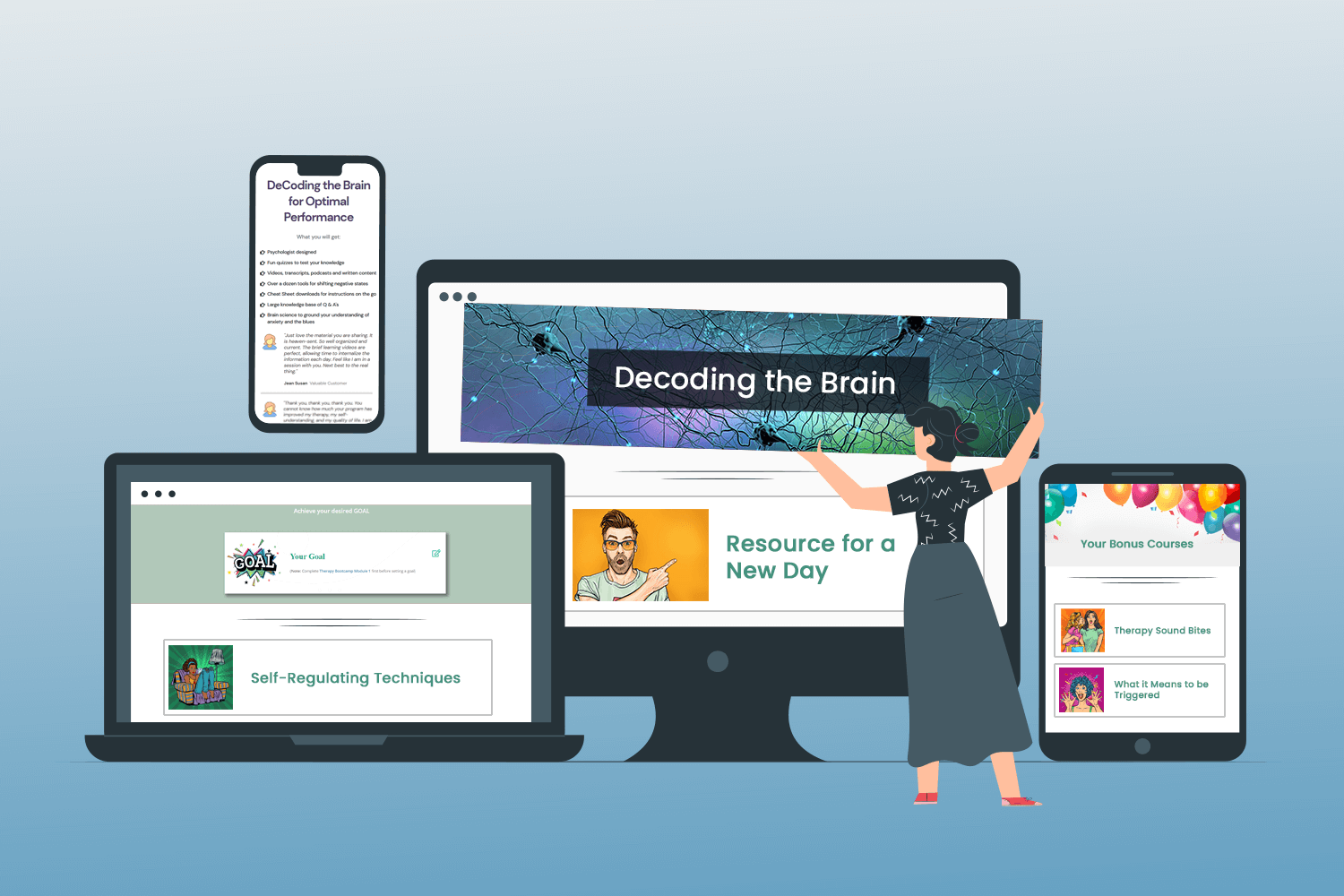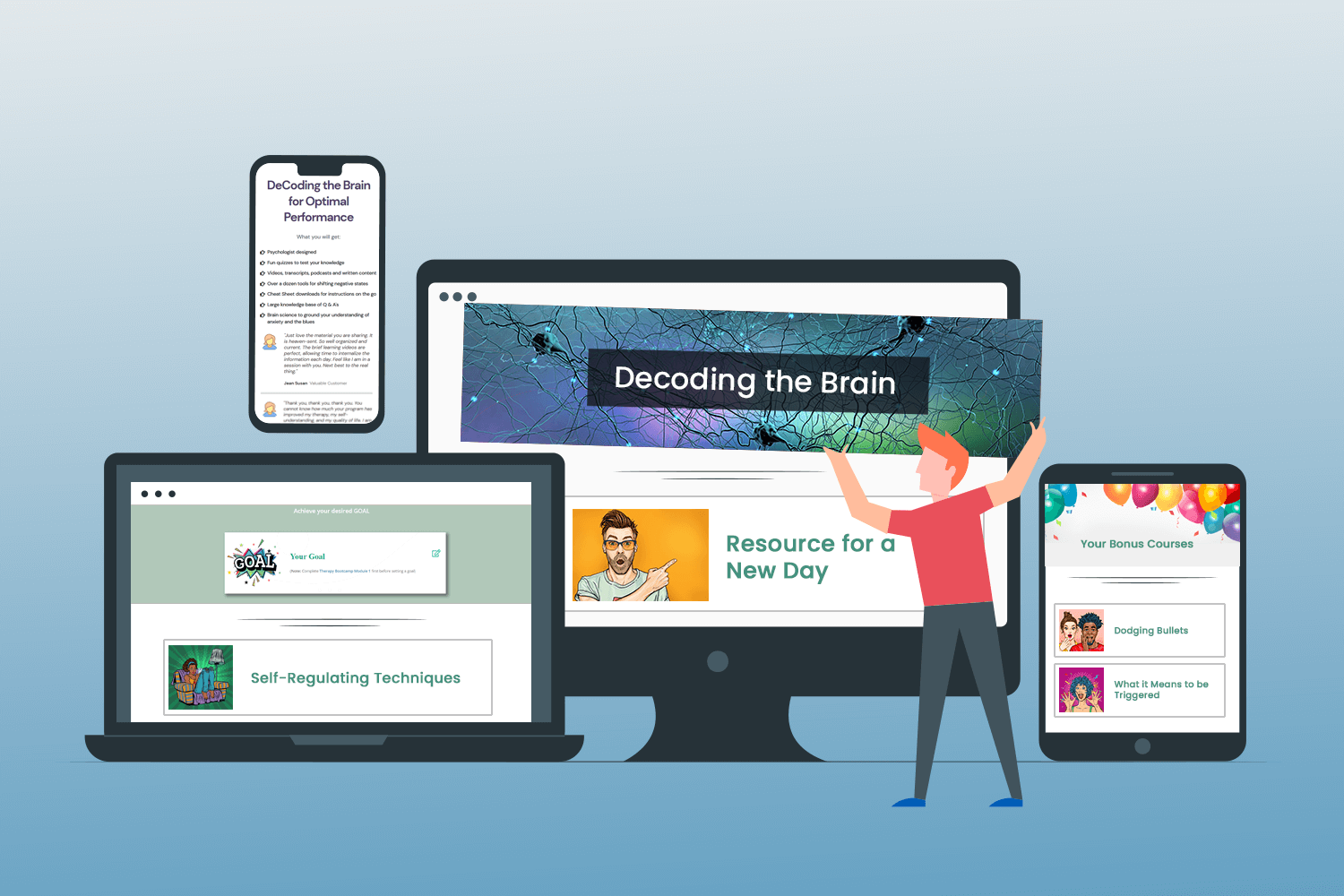If you look closely at this woman's eyes she might appear bored. It's the far-away, starry-eyed feel that suggests it's dissociation.
You can't remember what you discussed in therapy. You enter your session ready to talk about something and you leave wondering what happened!
Likely you dissociated in the session - yup, your mind went elsewhere.
Chances are, you're getting flooded. Face-to-face therapy might be too overwhelming for your nervous system. No worries, there are alternatives.
How online counseling helps with dissociation

Author: Dr. Susan LaCombe,
Hello, I'm Dr. Susan LaCombe Publisher of myShrink.com.
First off, just know that the fastest way I know to stop dissociating is therapy with a therapist you really connect with. Bar none, that's the most important piece.
Let's move on . . .
Improve your nervous system capacity with Dr. LaCombe's 'DeCoding the Brain'
I learned about dissociation first hand
I waited way too long to talk with a therapist back when I was a 20-something. I didn't know how counseling worked, I felt shy about asking for help, and I had no idea what to say. I didn't even know what dissociation was.
But I knew something was wrong.
That's the problem with dissociation. One day you're fine, the next you're not.
Then you start thinking "it's all in my head" because there doesn't seem to be a recognizable pattern.
I remember the brain fog, how easily muddled I got thinking things through . . . and so many slips in my memory.
I just put my poor memory down to the fact that I was so busy. (I had no conception of living a mindfully 'paced' life. That probably sounded dull to me.)
Getting 'sleepy-headed' was an everyday occurrence in my therapy. One therapist even laid out a blanket for me to sleep on.
Online therapy - an idea whose time had come
Not knowing too much about how therapy worked, I didn't see many options for me. There was no such thing as online therapy.
In looking back, with e-therapy I could've had more control over my sessions, feeling safer calling or emailing from the comfort of my own home.
Eventually I think I'd want a face-to-face therapist but moving from email to chat, then onto phone and Skype probably would have gotten me into therapy - and feeling better - a heck of a lot sooner.
Indeed, years later it was actually online counseling (see my video) that gave my face-to-face therapy a shot in the arm it needed to move forward.
Why online therapy might be a good place to start
I think one of the main reasons I like online counseling - at least to start one's therapeutic journey - is that for some folks who are suffering from dissociation - typical face-to-face counseling is sometimes overwhelming.
These folks end up leaving the session either feeling worse, or confused at best.
Often they give up on therapy altogether. (Another lost opportunity.)
But with online counseling, you can talk to a counselor right from home where you feel most comfortable. So if you start to zone out or feel overwhelmed, you just take a break.
Life after dissociation - my personal musings
No longer do you have to live with dissociation.
It is possible to move beyond it - you may feel better than you ever have!
You see, you got this way because of certain experiences. And with the right experiences with the right therapist you can override that old learning.
Many people have - including yours truly.
I wish you the best on your therapeutic journey!
When you're checking out in therapy - how a good therapist helps
Here's what you should know when you work with a therapist on your dissociation symptoms:
1. Dissociation usually overtakes you without warning.
A well-trained therapist can help you to identify when that happens, then help you come out of it. In time, you'll learn to recognize it more quickly in yourself.
2. It's the repeated practice of shifting out of that state that eventually re-wires your brain so you're no longer prone to dissociate.
Your therapist can interrupt and help you to ground when you reach a high level of activation. These "interruptions" help to re-train the brain.
3. When dissociation is strong, it may take several sessions to feel its ebbs and flows.
If your dissociation is particularly "thick", you can actually be making significant progress without even knowing it.
This is a normal part of the process. Your therapist can help by noting how far you've come and giving you feedback with tangible examples of your progress.
Your nervous system and dissociation
Dissociation is the mind-body response of the nervous system that's become over-stimulated. In other words, it's a natural psychophysiological reaction.
As an aside, that over-stimulation could conceivably be from a trigger. You're "triggered" anytime an early memory gets evoked and you feel the feelings and sensations from back then. Just know that you often don't recall the exact scene where the "feel" of the memory arises from. That's because all that's available to you are the remnants of it.
Dissociation varies in strength
Dissociative states often fade and strengthen many times throughout the day, depending on how "full" your nervous system becomes.
When you suffer from dissociation, you're bound to zone out by the end of the day and particularly, for any day that's full of pressure, stress - even excitement.
Why?
When your nervous system is "full", it cannot fully process all the stimulation it experienced throughout your day. It's overwhelmed and can't let go as it once did. (We refer to this condition as nervous system 'dysregulation')
Checking out in your therapy? Here's what to avoid.
When you see your therapist at the end of a stressful day don't be surprised if you dissociate in the session.
That's not altogether bad - you and your therapist can help you deal with it right there and then.

Brain Fact: The brain can only change in the present!
In a highly dissociated state, you should avoid talking about any deep emotional issues or traumatic events. They will only "add to your nervous system container" and make you dissociate even further.
Your nervous system needs to slow down and to "empty out" before you can return to the present moment.
This is a actually great time to use any grounding or body-based tools you have.
The reason body-based tools are useful is that they directly access the nervous system (unlike cognitive strategies eg. trying to tell yourself to calm down).
Barring that, just work on an easier topic or a shorter list. Spend as much time as it takes to get yourself back into the present.
Why therapy is the best medicine for dissociation
The nervous system was heavily influenced by interactions with your parents in the first few years of life. Essentially, day-by-day and through hundreds of interactions, your nervous system learned how to calm down.
In time, you could self-sooth even when your parents weren't around.
And growth didn't stop there - it continues to "learn" to this day.
So many years later and you're in therapy . . .
Through umpteen interactions with your therapist the nervous system learns to modulate your internal reactions to certain stressors.
In much the same way as before with your parents, your nervous system learns to manage strong emotions.
In short, you learn to tolerate the ups and downs of your emotions.
It does this by an unconscious process of imitation, using your therapist's nervous system as a model - just as you did with your parents many years before.
Body-based therapists really know how to do this. You can help this process by becoming acquainted with grounding and other body-based tools.
New to counseling?
You might find that if you're new to counseling, speaking to a counselor for the first time can make you feel a little uneasy. That's normal. Give yourself time - it's okay to begin with easy chatting. And feel free to ask your therapist questions as well.
Before your session, you might try writing down the things you want to change. That way you'll have something to look to if you get off track or you're not sure what to say.
For your first session, it's best to cover one issue at a time - though you may find some issues are so intertwined it's hard to separate them. That's okay - ask your therapist to help you identify one thing.





